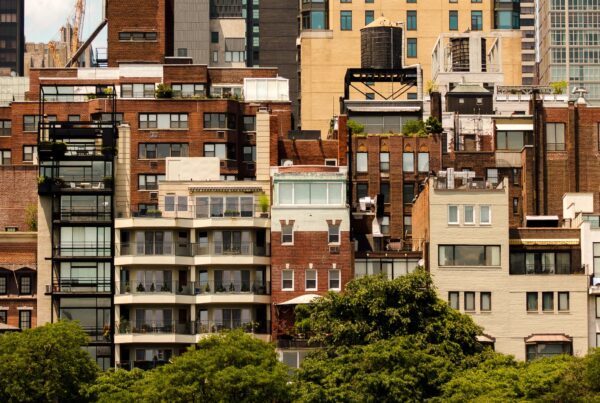7 Potential Changes to NYC Rent Laws
06/05/2019
Current NYC Rent Regulation laws are set to expire June 15th, 2019.
Democrats now control the New York Senate and the State Assembly. In order to make good on their promises to constituents, these lawmakers have introduced several new pro-tenant (or anti-landlord depending on how you look at it) bills.
These bills mean there may be some changes to the rent stabilization and rent regulation laws in New York City. They’ve caused a lot of fear in the real estate industry about what might happen when it comes to developing buildings in a multifamily market.
If you’re a developer or apartment building owner (big or small), it’s important to understand these new rules and regulations so you can come up with a solid economic plan. To help you out, I sat down with Mitch Kossoff, an attorney with more than 30 years experience in residential and commercial landlord-tenant litigation, to learn what the new bills might mean for developers. Listen to our conversation below.
Note: This article only highlights speculation of what Mitch believes to be the new ways the laws will change. We will all know for sure soon once the new laws are passed.
Here are the seven potential changes to look for in the upcoming New York City rent laws.
1. The End of Vacancy Decontrol
When a rent-regulated apartment becomes vacant today, vacancy decontrol means that a landlord can deregulate it and charge the market rate to a new tenant if the rent is above the threshold ($2,774.76).
These new laws may mean that vacancy decontrol goes away entirely or that there will be a much higher limit for when apartments become deregulated.
2. Vacancy Rent Increases Will Change
Current vacancy bonuses are at 20% for a two-year lease, meaning that when a tenant vacates a unit, the landlord can increase the rent by 20%. Industry experts believe that these new provisions will reduce that bonus in half to about 10% for a two-year lease and even less for a one-year lease!
3. Preferential Rent Will Stay in Place
Right now there are a lot of rent-regulated apartments with a two-tier rent system. This means that there’s the legal regulated rent, and there’s also a lower amount (the preferential rent) that the current tenant pays. Owners used to be able to remove that preferential rent at any time and increase it to the regulated rent amount.
The new laws may include a provision that doesn’t allow that anymore and requires landlords to keep preferential rents in place for as long as the tenant lives in the unit. This will mostly affect owners in areas where preferential rents are more common, like Upper Manhattan, the Bronx, parts of Brooklyn, and Queens.
4. Lower Increases for Repairs and Improvements
Current laws allow owners to raise rents by a certain percentage for work done in an apartment building (major capital improvements) or when an individual unit is upgraded (individual apartment improvements).
The new bills may alter these provisions significantly, change the percentage amounts landlords can raise rents by, or limit the categories in which landlords can charge an individual apartment improvement increase.
5. The Statute of Limitations for Overcharges May Increase
The new provisions would increase the statute of limitations for illegal rent overcharges from four years to six years or more. It would also change the length of time owners have to keep records. Right now, you only have to keep four years of records, but this number may also increase to six.
In order to be compliant, I recommend that investors are constantly thorough when doing due diligence on a building. If you are, you’re most likely going beyond that four-year mark already and making sure your building is properly deregulated under many different circumstances.
6. An Overall Blanket Cap Might be Coming
If all of the new provisions are passed, this might result in an overall blanket cap in the amount that rent can increase by. The combination of vacancy decontrol, vacancy bonus, and building and unit improvement provisions may lead to a cap for rent increases leading to more “universal rent control.”
7. Previously Deregulated Apartments Will be Re-Regulated
Finally, a new law may state that apartments that have been deregulated in the last 2-5 years that have not rented for a certain amount of time will be re-regulated at the rents that were charged as of January 1, 2019.
What These New Laws Mean for You
My advice about the upcoming laws? Don’t panic. There are a lot of question marks right now about what will pass, but it’s important to remember that real estate and politics are and always have been cyclical. If you’re going to hold onto a building for 30-50 years, there’s no use in over-worrying about what’s happening today.
Also, if you have vacant apartments right now, keep them vacant. You don’t want to spend a certain amount of money on a unit hoping you’ll be able to charge a specific rent only to have legislation enacted that impairs your ability to charge that amount
While current laws are scheduled to sunset on June 15, its possible that the date will be extended. There are so many moving parts in rolling out new provisions that lawmakers might need more time to iron out the details by the deadline.
To learn more, listen to our podcast episode about the new laws here, or feel free to reach out to me with any questions.
facebook LinkedIn Instagram Twitter




